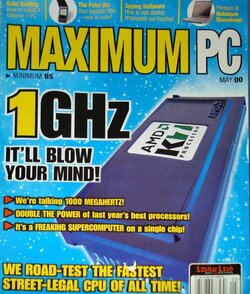If that was it's purpose, why would it come disabled? One would think to leave it at 66 mhz and press the button if there were issues.
I didn't read the artie, but, is that information sourced or just a theory?
Absolutely EVERYTHING I ever wrote for TheOverclocker is sourced, the magazine is owned and run by a very good friend of mine so I have a vested interest in not uploading speculation (unless expressly stated)/inaccurate information. We're going back quite a long time and to an article that had literally hundreds of sources so I don't remember exactly which one I used, but here are several:
http://www.pcguide.com/ref/case/switchTurbo-c.html
http://superuser.com/questions/192891/what-was-the-purpose-of-the-turbo-button
http://www.computerhope.com/jargon/t/turbo.htm
http://www.quora.com/History-of-Computing/What-did-the-turbo-button-on-early-90s-PCs-do
https://en.wikipedia.org/wiki/Turbo_button
Yes, I know some of those are wikis/sites where anyone can post anything, but you get the idea.
I went in confident I knew most of what there was to know about the history of overclocking, having started in the 90s myself. I was dished a very powerful dose of humility however, when I found out that many things existed prior to the commonly accepted first appearances

For example, the first experience I had with BIOS overclocking was ABIT's SoftMenu III and from what I knew that was the first of it's kind. A lot of research later I found out that... I'm going out on a limb here, but I think it was EPoX that had an even older motherboard with BIOS overclocking, but then delving even deeper into the archives I found that ABIT actually introduced the original SoftMenu back in
1996.
Anandtech and Tom's proved to be very valuable resources, with both being old enough to have reviews online covering a good portion of what I needed. For older info my sources even included the likes of BYTE magazine and Computer Shopper UK magazine. All of these were used for hard facts only (eg getting the specs of a motherboard) and cross referenced online wherever possible once I knew what I was looking for. Anything which could not be cross referenced between at least two sources (even if one ended up being someone who once owned the item in question, or personal experience such as slocket adapters, pencil mods, Gold Finger Devices, etc) was left out.
I hope that gives you some understanding of my... How should be say, journalistic standards? If it's in the article, it's as factually correct as I could possibly manage.
 )
)